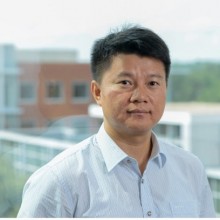Mechatronics and Automation for Revitalizing Critical infrastructure Health (MARCH) – Moving from Research to Application
Registration Link: https://events.vtools.ieee.org/m/271712
In this talk, I first give an overview of the state-of-the-art development in deep learning and AI. Then, I present two lines of our recent work: (i) Grammar Guided Representation Learning: Grammar models are natural, interpretable and fundamental schema in both language and image representation learning. Can grammars help us design better deep machine learning models that are interpretable and parsimonious? I will discuss two ways of harnessing the best of the two worlds, Grammars and Deep Neural Networks (DNNs): using a simple 1-D grammar to rethink and unify the design of neural architectures that achieve state-of-the-art results in computer vision, and using a simple 2-D grammar to rationalize state-of-the-art DNN-based object detection systems. (ii) Deep Consensus Learning: Both generative learning and discriminative learning have recently witnessed remarkable progress using DNNs. For structured input synthesis and structured output prediction problems (e.g., layout-to-image synthesis and image semantic segmentation respectively), they often are studied separately. As an example, I will discuss deep consensus learning (DCL) for joint layout-to-image synthesis and weakly-supervised image semantic segmentation. The proposed DCL sheds light on exploiting DNNs for distilling structured knowledge in many other domains. To conclude, I will also discuss some thoughts on building trustworthy and responsible AI under broader settings.

Dr. Tianfu (Matt) Wu
Assistant Professor, NC State University on May 19, 2021 at 12:00 PM in IEEE Webinar
Tianfu Wu received Ph.D. degree in Statistics from University of California, Los Angeles (UCLA) in 2011. He joined NC State University in August 2016 as a Chancellor’s Faculty Excellence Program cluster hire in Visual Narrative. He is currently an assistant professor in the Department of Electrical and Computer Engineering and affiliated with the visual narrative initiative. He works on computer vision, deep learning, deep grammar models, cost-sensitive bottom-up/top- down inference, lifelong learning by ALTER (Ask, Learn, Test, Explain and Refine). He has published over 30 papers on computer vision, statistical and deep learning and computing. His research has been focused on the three aspects: (i) Statistical learning of large scale and highly expressive hierarchical and compositional models from small or big data. (ii) Statistical inference by learning near-optimal cost-sensitive decision policies. (iii) Statistical theory of performance guaranteed learning algorithm and inference procedure.
The Department of Electrical and Computer Engineering, sometimes in conjunction with other NC State departments makes an ongoing effort to invite the brightest experts from academia, business, and research to come speak and share their ideas, experiences, and research with faculty, students, and alumni at NC State.
